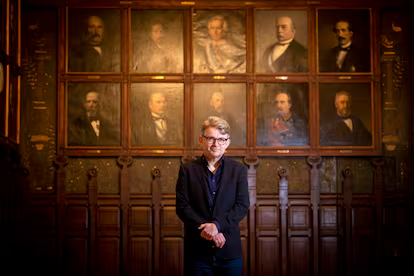Freemasons: The life and times of a men’s cult
John Dickie, author of ‘The Craft: How the Freemasons made the Modern World,’ explains how the secret society has persisted through the ages


A secret society created in Scotland in the 18th century, the Freemasons have spread across the world. Astronaut Buzz Aldrin even founded a Masonic lodge on the Moon.
John Dickie, author of The Craft: How the Freemasons Made the Modern World, says that Freemasonry is best understood as a paradox: it is a secret society, but the secrets are clear; it adheres to Enlightenment values, but its members have committed great cruelty.
Dickie, who is a professor of Italian Studies at University College London, says it is the ceremonial aspect of Masonry that unites the membership, whose rituals include the tearing of clothes, giving of symbols, kneeling or swearing.
How the Catholic Church made the Freemasons
The professor says that Freemasonry can also be understood as a kind of religion, due to its focus on death.
“As philosopher Bertrand Russell said, ‘Religion revolves around the fear of death,’” explains Dickie, adding that Masonic rituals and symbols allude to both death and resurrection.
Indeed, under fire from the secular revolutions of Europe, the Church was deeply threatened by the arrival of the Freemasons in the 18th century.
In 1850, Pope Pius IX gave the Jesuits “a crucial role” by putting that order in command of the magazine Cività Cattolica, a publication intended to spread the message of the Holy See among the largest possible number of readers. It lashed out at the Masons, blaming them for “all the ills of the world”. In doing so, the Jesuits made the conflict between the newcomers and the Church highly visible, and the Freemasons only won more members.
Atom bombs and anti-Semitism: Freemason values?
The Craft makes note of the contradictions between the humanistic ideas of Freemasonry with the sometimes brutal actions of its members. For example, Freemason US President Harry S. Truman, ordered the dropping of the first atomic bomb and caused hundreds of thousands of civilian deaths.
The Freemasons were crucial to the British Empire and its crimes, Dickie says, and undertook anti-Semitic activities long before Hitler came to power. At the same time, “Freemasonry takes many principles from the Enlightenment: transparency, equality between people, human rights. It’s a huge paradox.”
The Craft names a number of historical figures who have belonged to Freemason lodges throughout the world, including Garibaldi, Simón Bolívar, George Washington, Sir Arthur Conan-Doyle, Goethe, Oscar Wilde, Sibelius, Peter Sellers, Isaac Newton, Oliver Hardy, Walt Disney, Buffalo Bill, Nat King Cole, Mozart, and Haydn.
With such a pantheon of influential members, it is no wonder that the Freemasons have been associated with movements and groups as disparate as the Ku Klux Klan and the mafia. Dickie says the key to this influence lies in its organizational model, which can be easily replicated: the Masonic lodges are local cells that form a larger, interconnected network; a template that has been copied by other groups including the Mormon Church and the Rotarians.
A sense of unity and man’s search for meaning
Dickie is not a Mason himself, explaining that “I am an atheist and to be a Mason you have to believe in God, in a supreme being.”
He is sympathetic, however, to the sense of unity and meaning that members feel about their participation in the Freemasons:
“When one of its members is asked what Freemasonry means to them, their eyes begin to water, and you realize the importance of that feeling of belonging to a lodge and that they are trying to achieve something in life.”
“They have committed many hypocrisies, but I have respect for them.”
Tu suscripción se está usando en otro dispositivo
¿Quieres añadir otro usuario a tu suscripción?
Si continúas leyendo en este dispositivo, no se podrá leer en el otro.
FlechaTu suscripción se está usando en otro dispositivo y solo puedes acceder a EL PAÍS desde un dispositivo a la vez.
Si quieres compartir tu cuenta, cambia tu suscripción a la modalidad Premium, así podrás añadir otro usuario. Cada uno accederá con su propia cuenta de email, lo que os permitirá personalizar vuestra experiencia en EL PAÍS.
¿Tienes una suscripción de empresa? Accede aquí para contratar más cuentas.
En el caso de no saber quién está usando tu cuenta, te recomendamos cambiar tu contraseña aquí.
Si decides continuar compartiendo tu cuenta, este mensaje se mostrará en tu dispositivo y en el de la otra persona que está usando tu cuenta de forma indefinida, afectando a tu experiencia de lectura. Puedes consultar aquí los términos y condiciones de la suscripción digital.








































